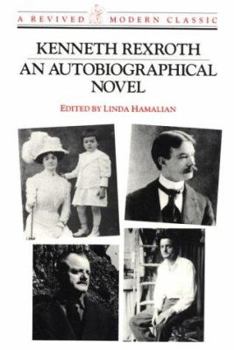Autobiographical Novel Pa
Select Format
Select Condition 
Book Overview
When the poet Kenneth Rexroth died in 1982, he left behind a sequel to An Autobiographical Novel (1966). His published memoir--all 365 pages of it--stopped at 1927, when the twenty-two-year-old writer and his first wife, Andr?e, were about to settle in California. Now revised and expanded, An Autobiographical Novel includes reminiscences that cover another twenty years of literary life and two more marriages. Linda Hamalian, author of A Life of Kenneth...
Format:Paperback
Language:English
ISBN:0811211797
ISBN13:9780811211796
Release Date:November 1991
Publisher:New Directions Publishing Corporation
Length:564 Pages
Weight:1.48 lbs.
Dimensions:1.4" x 5.5" x 8.5"
Customer Reviews
2 ratings
Absolutely worthy entry into the American canon
Published by Thriftbooks.com User , 17 years ago
It is unfortunate that this fantastic narrative has been so neglected since Rexroth's death. I have considered this book to be one of the masterpieces of American literature ever since I first read it as a teenager, required reading in for every American Studies major at every liberal arts college and university in the USA. I hope that one day in the next decade or so, my own children will read it with as much enthusiasm as I did. In every respect, it is stylistically a quite original, completely American, work: it is neither a novel nor an autobiography but inhabits a middle ground between the two; it was composed by speaking into a tape recorder rather than written; it is a perfectly crafted ku:nstlerroman ("If this story has a plot or a theme it si the tale of aboy's effort to select and put in order the tools with which he would live his adulthood") and also a rambling yarn of the kind that seems to spin off subnarratives and stories within stories, and digressions in all directions (Rexroth isn't even born until Chapter 2, for example, and as originally published the narrative only reaches his 22 year); and finally, it is an amazing contrarian, counter-mythical depiction of a United States of America that Rexroth grew up in, as it was 100 years ago, a country that few people in our day and age realize ever existed (or as Rexroth in his forward puts it "to many people it may seem a most atypical childhood and youth. I do not think it is, or if it is, it is at least characteristic of one kind of American life."). From a geneological perspective (in the postmodern, French sense) this book is a snapshot of the pre-history of the ethical experience of life in the 20th/21st century. The postlude is absolutely brilliant and should be read, I think, before the book itself, to understand what it is you are about to read and how to put it in context. The one drawback to this book is that it is edited posthumously by Linda Hamalian, a scholar who has demonstrated her own dissapproval for Rexroth as a person in her biography of Rexroth. I am uneasy reading a book that has been edited by someone who, in her own introduction, makes it clear that she is extremely skeptical of most of what Rexroth says, that the work is a specimen of the "ebb and flow of his imagination". For Hamalian, the issue - what makes this book relevant - is the fact-fiction question (which to me is precisely the most irrelevant question this book raises). For all I care, Rexroth could have made every word up, and, in a sense, it would still be all true in a sense, as true as Upton Sinclair's The Jungle (just to cite another book about life in Chicago in the early years of the last century). It is sad that Rexroth's primary posthumous biographical champion is someone who is so unwilling to champion his text for what it is - a boundary-bending masterpiece - and is so focused on narrow questions of conforming to genre and sticking to verifiable fact.
Another beautiful mind
Published by Thriftbooks.com User , 18 years ago
The world may one day re-discover or discover the brilliance of Rexroth. It would be nice if it did. In the post-millenial world, Rexroth's life and works might seem to be from an alternate universe, not as high-tech as the one in the Matrix, but a lot more profound. Quitting school at the age of 11, Rexroth mastered every major European language as well as Japanese and Chinee, and Greek & Latin; he was a poet, painter, jazz club manager (where a cop bashed him in the face during a 'raid', he was an iconclast, socialist, environmentalist, and knew more about prosody than anyone alive. His life is spectacularly interesting, and he could make outlandish statements about art: Like 'anyone who knows anything about Italian prosody, knows Dante was a bad craftsman' or dismissing Leslie Fiedler in one sentence as a would-be WASP who is so ignorant of the American spirit, the best he can come up with is that Huckleberry Finn is gay (paraphrase). While MLA junkies analyze how many angels they can deconstruct in a nanosecond, Rexroth knew the value of literature and the value of life. The U. of Berkeley spent years begging him to teach there, and he finally gave in provided he could teach anything he wanted. He called universities smoke factories. This view has been substantiated today: not only metaphorically but literally.





